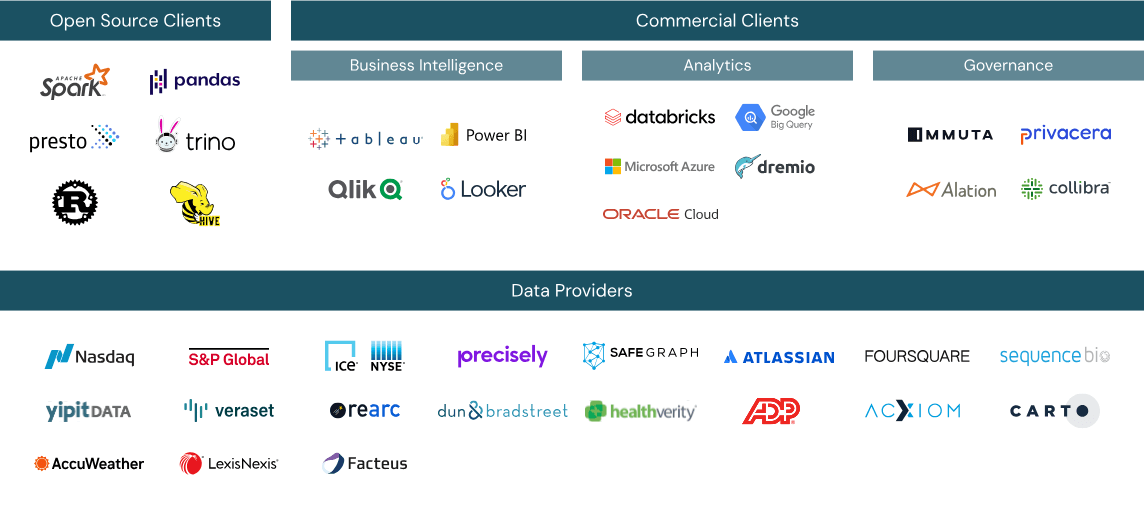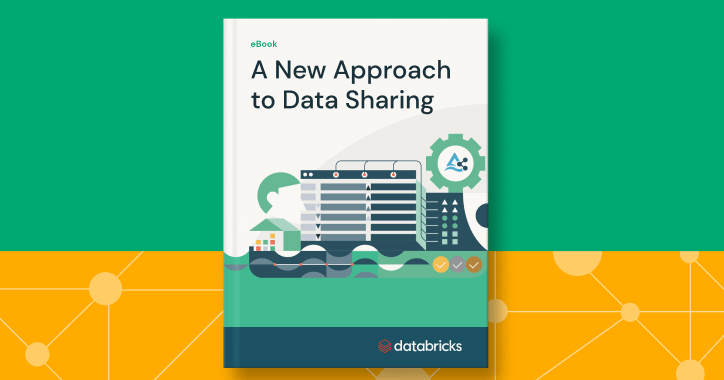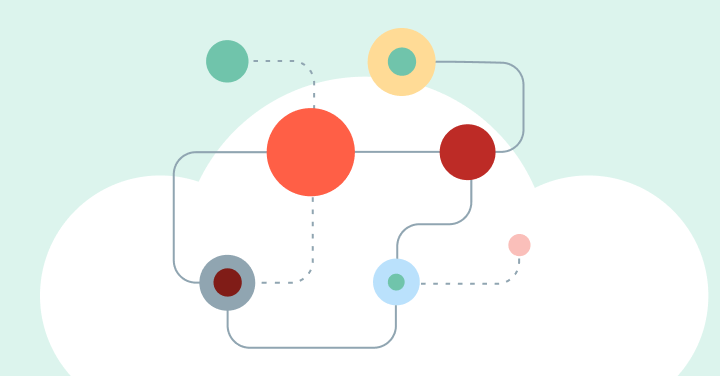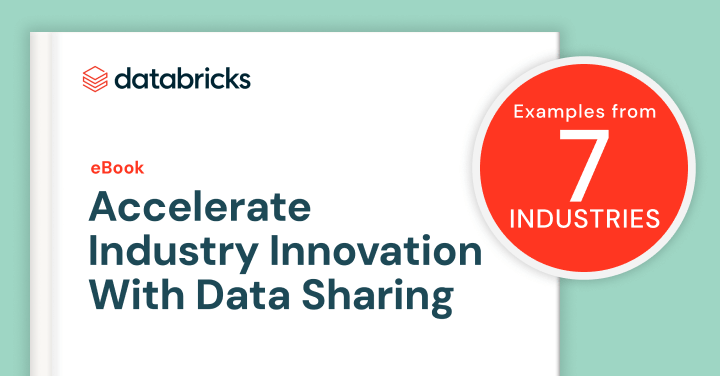Data Sharing
What is data sharing?
Data sharing is the ability to make the same data available to one or many consumers. The ever-growing amount of data has become a strategic asset for any company. Sharing data — within business units as well as consuming data from external sources — is an enabling technology for new business opportunities. Sharing data allows you to collaborate with partners, establish new partnerships, and generate new revenue streams with data monetization.
Here’s more to explore
What are the types of data sharing?
There are many different types of data sharing, including sharing within an organization and sharing outside of an organization, one-on-one sharing, sharing with multiple recipients, public sharing, and private sharing. Companies may use public or private data marketplaces to enhance their data sharing and collaboration as well as privacy-safe data clean rooms for sensitive data, such as personally identifiable information (PII).
What are the challenges of data sharing?
Data sharing is essential to modern businesses, but it can be challenging. One of the most critical of these challenges is security. Sharing only the right data with the right people within the right context requires strategic policies, effective tools and intentional processes that are consistently followed. Data governance — ensuring that data is used in compliance with specific regulations — is another challenge. In addition, technical and structural data management issues such as managing multiple systems and legacy or proprietary solutions can place roadblocks in the way of efficient and effective data sharing.
What are the benefits of data sharing in an organization?
Data sharing is crucial for the evolution of the data-driven business model. Gartner predicts that by 2024, organizations that promote data sharing will outperform their peers on most business value metrics. Data sharing eliminates data silos, resulting in greater efficiency and transparency and increased collaboration within an organization, as well as with partners. Data sharing also provides organizations with new and faster time to insights that help improve performance. Finally, data sharing provides possibilities for revenue streams by enabling an organization to offer new data products or services.
Traditional data sharing technologies
Legacy technologies such as SFTP (secure file transfer protocol), email, or APIs (application programming interface) allow the implementation of vendor-agnostic homegrown solutions that will work both on-premises and on clouds. However, they are often costly to manage and maintain and are increasingly difficult to secure and govern as modern data requirements have evolved. Using these solutions can make data sharing complex and time-consuming, and they don't scale to accommodate large datasets.
Cloud object storage is a good fit for the cloud because its scalability supports unlimited data growth. It's widely available, cheap, and reliable, but there are downsides. For example, recipients must be on the same cloud to access the data, and security and governance processes can be complicated. In addition, sharing large volumes of data via cloud storage is time-consuming, cumbersome and nearly impossible to scale.
Commercial/closed source data sharing offerings
Data sharing solutions are baked into vendor products such as Oracle, Amazon Redshift or Snowflake. These solutions are convenient to use within a product and allow users to share data easily with anyone who uses the same platform. However, users can't share data with users of competing solutions and vendors often limit scalability. With these solutions, data must be loaded onto the platform, which requires extract, transform and load (ETL) and creates data copies. All these restrictions create complexity, version control issues and higher costs for sharing data with recipients on different cloud platforms.
Open source, modern data sharing solutions
In today's reality of sometimes complex infrastructures with multiple platforms, having an open source data sharing solution can offer valuable flexibility. Open source-based solutions eliminate the lock-in of vendor products and bring a number of additional benefits such as community-developed integrations with popular, open source data processing frameworks. Open protocols also allow the easy integration of commercial clients, such as BI tools.
Data marketplaces
Data marketplaces enable data sharing and data monetization, and they are important tools in data sharing and collaboration. Marketplaces can take different forms, including:
- Internal data marketplaces for data sharing within a company
- Private data marketplaces for data sharing with trusted partners
- Public data marketplaces that connect data providers and consumers
Public data marketplaces offer participants the opportunity to buy and sell data and related services in a secure environment offering high quality and consistency directly from the data providers. Companies may use marketplaces to acquire third-party data to enrich their existing data, or offer and monetize new data products and services.
Data clean rooms
Data clean rooms allow businesses to easily collaborate in a secure, governed environment with customers and partners on any cloud in a privacy-safe way. Within a data clean room, multiple participants can join their first-party data and perform analysis on the data without the risk of exposing their data to other participants. Participants have full control of their data and can decide which participants can perform analysis on their data without exposing any sensitive data such as PII.
Delta Sharing
Delta Sharing is the world's first open protocol for secure data sharing, making it simple for organizations to share data with other organizations regardless of which computing platforms they use.
- Share live data directly — Easily share existing, live data in your Delta Lake without copying it to another system.
- Supports diverse clients — Data recipients can directly connect to Delta Shares from pandas, Apache Spark™, Rust and other systems without having to first deploy a specific compute platform. Reduce the friction to get your data to your users.
- Security and governance — Delta Sharing allows you to easily govern, track and audit data access.
- Scalability — Share large-scale datasets reliably and efficiently by leveraging cloud storage systems like S3, ADLS and GCS.
Delta Sharing on Databricks
Databricks natively integrates with Delta Sharing in Unity Catalog, providing a streamlined experience for sharing data both within and across organizations. Recipients don't have to be on the Databricks platform, on the same cloud, or on a cloud at all.
Delta Sharing delivers several key benefits, including:
- Open cross-platform sharing
- Live data sharing without replication
- Centralized governance
- The ability to share data products, including AI models, dashboards, and notebooks, with greater flexibility
- Lower cost
- Reduced time to value
Delta Sharing is an open ecosystem of open source and commercial partners that continues to grow. Databricks has recently expanded Delta Sharing partnerships to include Cloudflare, Dell, Oracle and Twilio.

Learn more about data sharing on Databricks
With Delta Sharing, you share live data easily and securely across platforms, clouds and regions. Delta Sharing is already transforming data sharing activities for companies in a wide range of industries. Get started today with Databricks Delta Sharing.


